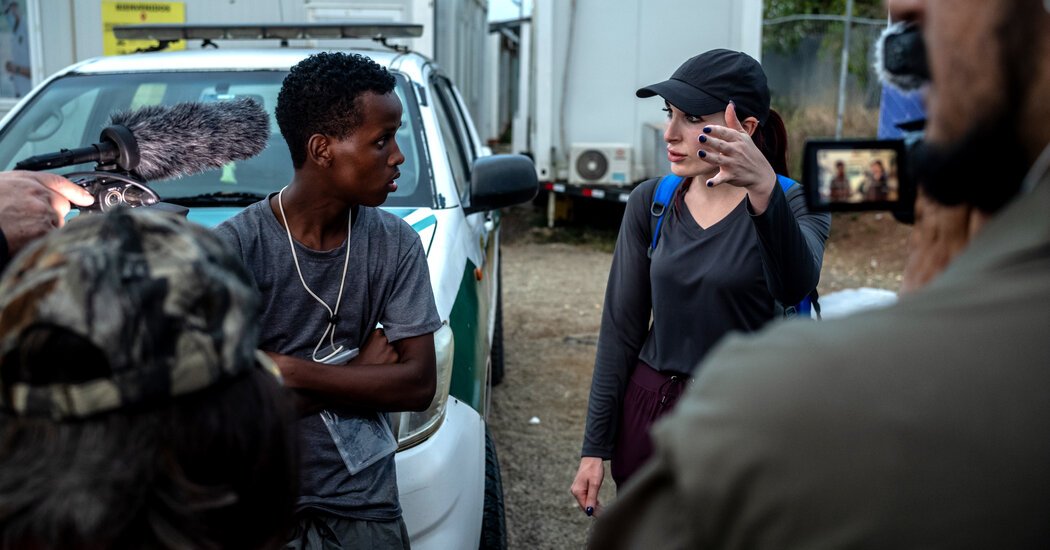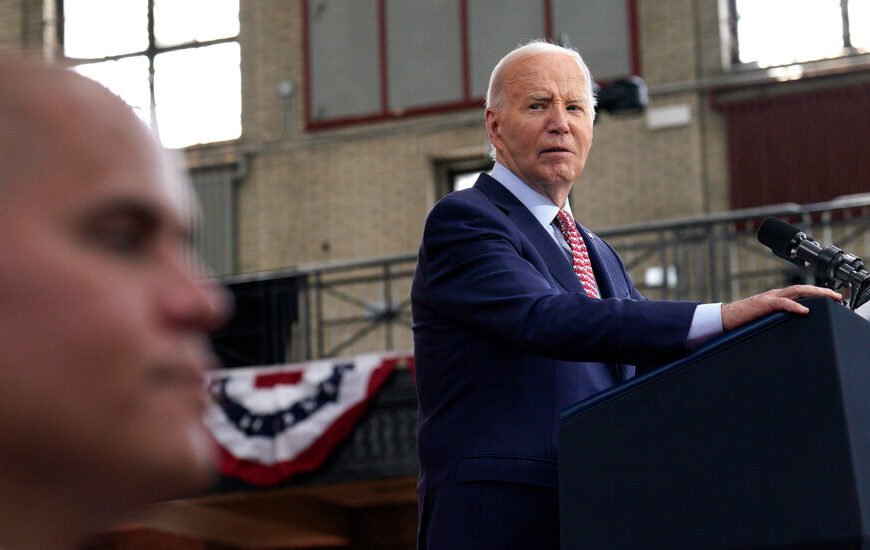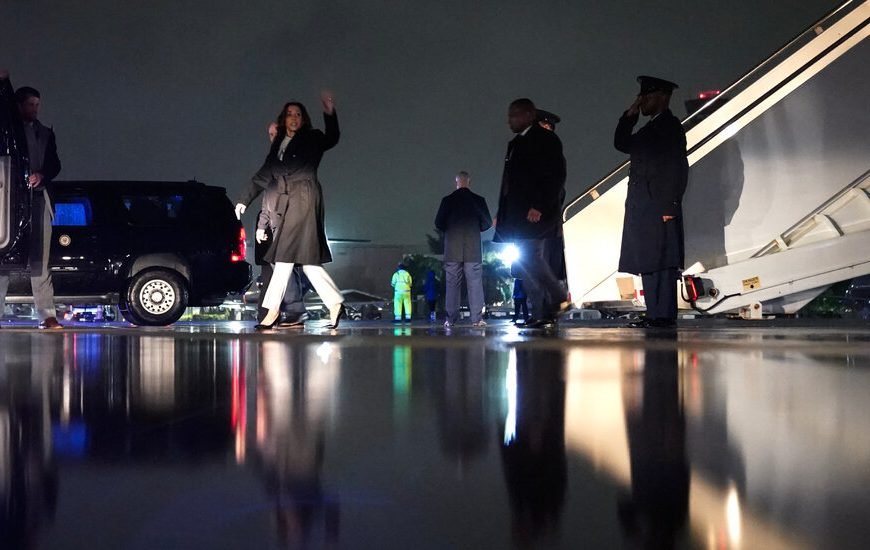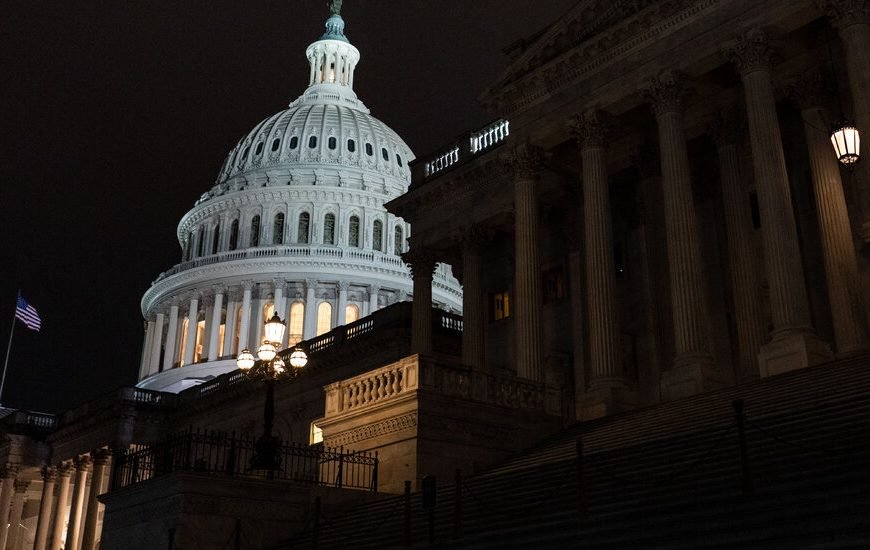Ayub Ibrahim had just walked out of the jungle. His feet still ached. A month earlier, he had left his home in Somalia, fleeing a civil war, he said, traveling first to Turkey, then Brazil and finally crossing on foot through a 66-mile expanse of wilderness known as the Darién Gap.
Resting in the sweltering San Vicente migrant camp in Panama with hundreds of other recent arrivals, he suddenly found himself surrounded by a half-dozen Americans with video cameras.
“Do you guys like Ilhan Omar?” one person asked. “What do you think about Joe Biden?”
Mr. Ibrahim, 20, answered the questions. He said he liked and admired Ms. Omar, the first Somali-American to serve in Congress. He doesn’t follow American politics, he added, but thinks Mr. Biden is a good president. When asked if Mr. Biden or former President Donald J. Trump would be better for immigrants, he chose Mr. Biden.
Later, Mr. Ibrahim would say he had felt ambushed and confused by the questions. He hadn’t intended to make a political statement.
But by then, it was too late.
One of his questioners, Laura Loomer, a right-wing activist and former Republican candidate for Congress, had already posted an edited video of the conversation online. It had rocketed around the internet, amassing nearly two million views on X.
The caption read: “Somali illegal aliens proclaim support for Ilhan Omar and Joe Biden inside Panama migrant camp!”
As immigration becomes a dominant issue in the 2024 presidential race, right-wing media has been awash in gritty and often deceptive videos of migrants emerging from the Darién Gap, a roadless stretch of Panamanian jungle that has become a bottleneck for thousands of people on their way to the United States.
The clips are presented as proof of what Republicans often describe as an “invasion” of Muslim terrorists, Chinese spies and Latin American criminals. Posted widely on social media, the videos blame President Biden for the migration and suggest, falsely, that Democrats are encouraging it to create new, illegal voters. International aid organizations are cast as profiteers making money off human misery.
The New York Times traced much of that content to the work of Michael Yon, a former Green Beret who over the past three years has become the go-to tour guide for right-wing journalists, politicians and social-media influencers wanting to see the Darién Gap firsthand.
Those travelers have included, along with Ms. Loomer, the Republican Representatives Tom Tiffany of Wisconsin and Burgess Owens of Utah, reporters, producers and podcast hosts for The Epoch Times, a right-wing newspaper, and correspondents for Real America’s Voice, the digital media company that hosts Stephen K. Bannon’s podcast.
Videos and other content made by the visitors have come to serve as a kind of B-roll footage accompanying conversations about immigration on Fox News, Tucker Carlson’s online show and even for Mr. Trump himself.
On Friday, the Republican presidential candidate reposted a video on Truth Social made by Ms. Loomer. It included several clips from her trip to Panama, including a snippet of her conversation with Mr. Ibrahim.
The Times followed one group as it toured camps on the edge of the Darién Gap, observing and recording as participants, interviewed migrants and shot video. The reporters, producers and influencers, gravitated toward migrants from Africa, China and the Middle East, barraging them with politically loaded questions.
Their posts amplified what they perceived as gotcha moments while dismissing answers that appeared to challenge their preconceptions.
When asked whether he had been given money by the United Nations or humanitarian groups, Mr. Ibrahim said he had not. He also said that as a Muslim he supported equal rights for women and was opposed to discrimination against gay people. Those portions of the interview were cut from the version posted online and missing from Ms. Loomer’s later accounts.
In an interview with a call-in talk show on Infowars, the far-right platform, Ms. Loomer questioned whether the Muslims she encountered, including Mr. Ibrahim, were “jihadists or people who have jihadist tendencies.”
Reached the next day on a bus bound for Costa Rica, Mr. Ibrahim said he regretted the experience. “She wanted to give a bad picture about immigrants to the world,” he said of Ms. Loomer. “Her questions weren’t fair.”
Clips of migrants in Panama have become weapons in the information battle being waged over immigration, experts said. The content, looped again and again online, is highly effective, particularly in creating the perception of the threat of violence, said Guadalupe Correa-Cabrera, a political science professor at George Mason University who has studied social media’s impact on immigration.
The images, she noted, tend to focus on young men while excluding women and children, who might generate more sympathetic responses. The migrants are often referred to as “military-aged men” and “invaders” and their claims of political or religious persecution at home are often dismissed as scripted falsehoods.
“This is straight from the textbook for how you build a narrative,” Ms. Correa-Cabrera said.
The influencers and media figures on the tours argue that they are shedding light on a crisis that mainstream outlets either downplay or refuse to cover. Ms. Loomer described herself as a journalist. “My reporting was so powerful,” she said.
The focus on Muslim and Chinese migrants may create a distorted impression. Roughly 90 percent of the 520,000 people who crossed through the Darién Gap last year were South Americans and Caribbeans, according to the Panamanian government. The vast majority of that group comes from Venezuela, Ecuador and Haiti, countries experiencing economic and political upheaval.
The number of migrants from Africa, China and the Middle East coming through the Darién Gap has boomed in the past two years, but is less than 8 percent of the total. Panama screens migrants from those regions for potential criminal or terrorist connections. So far, the terrorism threat they might represent is theoretical. Several academic studies have found no correlation between immigration and acts of terror, a review by the Council on Foreign Relations published last fall found.
Critics warn that inflammatory coverage of these complex problems only serves to aggravate a humanitarian crisis.
“The misrepresentation of the migrants crossing the gap as invaders or illegals puts their life at risk,” said Sandie Blanchet, UNICEF’s representative in Panama. “It can justify harsh treatment and even violence against them.”
Inside an ‘Invasion Investigation’
On a steamy February afternoon outside a government migrant camp on the edge of the Chucunaque River, Mr. Yon escorted a reporter and photographer from The Epoch Times up a hill, pausing to gesture at three weary Venezuelan migrants limping across a bridge.
“If we lose this, it is over. You know what I mean? The United States is done,” he said.
In some circles on the right, an invitation to tour with Mr. Yon has become something of a golden ticket, promising access on the ground and publicity upon return.
A swaggering Special Forces veteran, Mr. Yon has long had a knack for getting attention. In his autobiography, he recounts killing a man with his bare hands in a bar fight. (Charges against him were eventually dropped.) He later made headlines as a frontline blogger and photographer at the height of the wars in Iraq and Afghanistan.
He has since immersed himself in right-wing politics around the globe. In 2014, he was recruited by Japanese activists to dispute the long-established existence of “comfort women,” the Korean women forced into sexual slavery during World War II. More recently, he joined Dutch farmers protesting environmental reform, claiming it was part of a plan to replace the country’s population with immigrants.
On Jan. 6, 2021, he was outside the U.S. Capitol and later falsely said that the rioters were spurred on by “agent provocateurs” connected to Antifa.
That year was a turning point for migration through the Darién Gap, an inhospitable stretch of mountainous wilderness that is riddled with poisonous snakes and roving gangs of criminals. What had been a trickle of just a few thousand people crossing the gap each year gushed to 133,000, an increase fueled largely by Haitians fleeing economic chaos.
Mr. Yon arrived in Panama that February and began his tours shortly after — including one with Mr. Tiffany and Mr. Owens. In total, he estimates he has brought as many as 60 people to see the camps in person, and tries to remain behind the scenes. “I just want people to see for their own self and make their mind up,” he said.
But he often portrays himself as an expert, sitting for frequent interviews with the conspiracy theorist Alex Jones, as well as in a 2022 video called “Alien Invasion” produced by Representative Andy Biggs, a Republican of Arizona.
Mr. Yon says he makes no profit from the trips. Guests cover their own expenses, including $35-a-night rooms at a modest hotel just steps from a migrant camp. He also raises money online: A crowdsourced fund-raiser begun in February to pay for a “Darien Gap Migrant Invasion investigation mission” has raised just shy of $13,000.
Ms. Loomer, for her part, initially sought to raise $14,500 to fund a seven-day trip but blew past that goal, extending her stay by three days and raising close to $28,000.She said she did not make a profit.
Last week, she started a new online fund-raiser, seeking $100,000 to pay for a film about her experiences in Panama. Its title, she said, will be “The Great Replacement,” a reference to the conspiracy theory that Democrats are encouraging immigration in a scheme to replace white voters.
A Narrative Takes Hold
Mr. Yon and his tours often take aim at the humanitarian organizations at work in the area, reserving particular ire for one United Nations agency — the International Organization for Migration. The groups, they say, incentivize migration by providing health care, psychological support and nutrition both before and after migrants make the journey.
That aid is paid for by government contributions and private donations, funds that Mr. Yon calls “profits” that motivate the organizations to encourage more migration.
Diego Beltran, interim director for Central and North America and the Caribbean for the migration organization, disputed the characterization, noting that the U.N. doesn’t profit from its activities and that it works to find alternatives to migration. The agency has helped more than four million migrants settle legally in South America rather than move north to the U.S., he said.
“There is a great deal of disinformation in this area,” Mr. Beltran said. “It’s clear that migration is increasingly a political issue in many countries. But we don’t agree with efforts to stigmatize migrants and increase xenophobia.”
Another target is HIAS, formerly known as the Hebrew Immigrant Aid Society, a U.S. nonprofit that provides services, including legal aid and mental health, to migrants. Mr. Yon’s tours have made an issue of the large maps of the region it posts on some of its facilities in Panama, claiming they encourage people to make the trek.
HIAS officials say the maps, which do not detail specific routes through the gap, are meant to help migrants find aid stations.
“We certainly don’t encourage migration,” said Mark Hetfield, the HIAS president. “All we’re offering is a way to assist those who arrive there.”
Mr. Hetfield said many of the criticisms of his group were grounded in antisemitism, noting that the man who murdered 11 people at a Pittsburgh synagogue in 2018 had frequently posted rants about the group. “HIAS likes to bring invaders in that kill our people,” the killer posted online just hours before the attack.
Mr. Yon has also claimed, without evidence, that the group is helping dangerous migrants enter the U.S. “They’re going to scream ‘Allahu akbar! And they’re going to shoot” them, he said, using an obscenity, at an anti-immigration rally last month near Eagle Pass, Texas. “And they’re coming across the border and it’s being funded with Jewish money.”
There is some evidence that the narrative cultivated by Mr. Yon and others in his groups is having an impact. This month, after influencers who visited the region posted dozens of complaints online about maps hung by international groups, the director of Panama’s National Migration Service raised a similar concern, calling it “irresponsible.”
HIAS has since removed some of its maps in the region, saying it did so for “security reasons.”
‘Angels of the Jungle’
Mr. Yon has forged close ties with the Panamanian government, and particularly its border patrol. His groups have frequently received unrestricted access to migrant facilities, while mainstream journalists are often prohibited.
A key to that access is Oscar Ramirez, a Mexican activist and correspondent for Real America’s Voice, who since early last year has worked with Mr. Yon in Panama as a fixer and translator. With a military bearing, he greets border officers with hugs at checkpoints and receives armed escorts on treks through the Darién Gap itself. And while he is quick to rail against international groups, he calls the border patrol “angels of the jungle” in social media posts and news reports.
At a recent security forum in Panama City, Maj. Nelson Moreno, a border patrol protocol officer, described Mr. Ramirez as “an integral part of our border DNA.”
Two days earlier, a border guard stopped Times journalists from traveling to an Indigenous village where Mr. Ramirez and Mr. Yon, along with roughly a dozen American influencers, were filming migrants.
Although there were no other witnesses to the episode, Ms. Loomer discussed it in an interview on Infowars, the right-wing website founded by Mr. Jones, the following day, saying the agency considered the Times journalists a “security risk.”
Mr. Yon later said he had learned about the episode from sources in the region. You can’t make a move in the Darién Gap, he said in an interview with The Times, “without me hearing about it.”
Constant Content Creation
Over 10 days, Ms. Loomer visited four migrant centers, navigated rivers in motorized canoes, rode through the Panama Canal, and posted nearly 100 times on X about the trip. One video has over 4.5 million views and was shared by Michael T. Flynn, Mr. Trump’s former national security adviser.
“We are being invaded,” Ms. Loomer said in the clip, as she boarded a bus with migrants. “We are being replaced and it’s no accident it’s happening in an election year.”
In the crowded San Vicente camp, Yazdan Faramehr, a 29-year-old bodybuilder from Iran who speaks good English, was encircled by Americans clutching video cameras. As they peppered him with questions, he told them he was hoping to get a fresh start in Los Angeles’s large Persian community.
But Mr. Faramehr grew uncomfortable when Ms. Loomer, who once identified herself as a “proud Islamophobe,” but now rejects the label, began asking about Iranians coming the U.S. to “commit acts of Islamic terrorism.” Worried about drawing unwanted attention or putting his family at risk, he asked that the group not use his image.
Mr. Yon posted a clip on X anyway. It drew dozens of replies from people speculating that Mr. Faramehr, who said he worked in human resources in Tehran, was a dangerous intruder with a secret agenda.
Reached as he traveled north from Panama, Mr. Faramehr gave The Times permission to use his photo. He said he thought it was fair of Mr. Yon’s tour to “criticize their country’s immigration system” but felt like they were trying to trap him.
“To be honest,” he said, “I wish I never talked to them.”


















